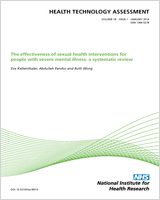Included under terms of UK Non-commercial Government License.
NCBI Bookshelf. A service of the National Library of Medicine, National Institutes of Health.
Adams J, Bateman B, Becker F, et al. Effectiveness and acceptability of parental financial incentives and quasi-mandatory schemes for increasing uptake of vaccinations in preschool children: systematic review, qualitative study and discrete choice experiment. Southampton (UK): NIHR Journals Library; 2015 Nov. (Health Technology Assessment, No. 19.94.)

Effectiveness and acceptability of parental financial incentives and quasi-mandatory schemes for increasing uptake of vaccinations in preschool children: systematic review, qualitative study and discrete choice experiment.
Show detailsScenario 1: gift of money (universal)
Anna is a mum of two. Her youngest child, Alfie, is only a couple of months old.
A new scheme has just started in Anna’s area that means she will receive a cash payment for each completed course of vaccinations that Alfie receives. All parents with children in Anna’s area are eligible for this new scheme.
For example, once Alfie has had both of his measles, mumps and rubella vaccinations, Anna will be paid £50.
Anna will be paid for only vaccinations that are on the NHS list of recommended routine vaccinations.
Scenario 2: gift of money (targeted)
Emma has a son, Joshua, who is 1 year old. Joshua has had some of his vaccinations, but not all of them are up to date.
A new scheme has been introduced to make sure that children have received all their vaccinations on time. That means that all children that either have not had any vaccinations or have not had them all are being chased up.
Emma received a letter saying that if she brings Joshua into her GP practice and gets all of his vaccinations up to date she will be paid a cash bonus.
Parents that have already had their child immunised are not eligible for the cash bonus.
Scenario 3: receipt of universal benefits (child benefit)
Jonathan and his partner get the standard £20.30 child benefit each week for their daughter Amelia. But there has been a change to the way it is paid.
Now, Jonathan and his partner will get their child benefit only if they keep up to date with Amelia’s vaccinations. This means that they are asked to prove that Amelia has had her vaccinations, or provide an exemption letter from a GP, or their child benefit will be stopped until Amelia has had them.
Scenario 4: removal of child care contributions
Gemma puts Charlie into child care while she goes to work.
Gemma gets help toward paying for child care from the government. However, she has to send proof to the government that Charlie has had all of his vaccinations or an exemption letter from a GP – otherwise her help with payment will stop.
Scenario 5: mandatory for entry into registered day-care
Edward is 3 years old and goes to day care 3 days a week. So that Edward can go to day care his parents had to prove that he had had all of his vaccinations, or show a letter of exemption, before he could attend.
Edward’s parents have to do this every year to show that he is up to date with his vaccinations. If they don’t, Edward is not allowed into day care.
Scenario 6: mandatory for school entry
Blake starts primary school this year. However, to be able to enrol in school his parents have to prove Blake has had all of his vaccinations, or have a letter from the GP to say that he is exempt.
If Blake is not up to date with his vaccinations or exempt from having them he cannot start primary school.
- Vignettes for focus groups with parents and carers - Effectiveness and acceptabi...Vignettes for focus groups with parents and carers - Effectiveness and acceptability of parental financial incentives and quasi-mandatory schemes for increasing uptake of vaccinations in preschool children: systematic review, qualitative study and discrete choice experiment
Your browsing activity is empty.
Activity recording is turned off.
See more...